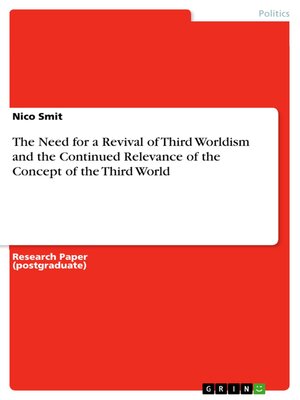The Need for a Revival of Third Worldism and the Continued Relevance of the Concept of the Third World
ebook
By Nico Smit

Sign up to save your library
With an OverDrive account, you can save your favorite libraries for at-a-glance information about availability. Find out more about OverDrive accounts.
Find this title in Libby, the library reading app by OverDrive.



Search for a digital library with this title
Title found at these libraries:
| Library Name | Distance |
|---|---|
| Loading... |
Research Paper (postgraduate) from the year 2010 in the subject Politics - Topic: Development Politics, grade: 76%, University of Cape Town, course: International Relations Honours, language: English, abstract: The end of the Cold War, some have argued,1 has dealt the three worlds classification scheme
a fatal blow and the break-up of the former Soviet Union and the associated disintegration of
the Second World has to a large extent diminished the rationale which underlay the concept
of the Third World.2 Furthermore, from its heyday in the 1970s, Third Worldism has been on
a path of terminal decline due to a number of factors, such as disproportionate economic
development among Third Worldist states,3 political differences and the failure to establish a
"common programme for international economic and political reform."4 Within the literature
relating to Third Worldism, the concept of the Third World itself, and the three worlds
scheme, there is a lively debate with some arguing that the concept has become an
anachronism,5 others maintaining that the concept maintains significance in the contemporary
era. Furthermore, while there is general consensus within the literature that Third Worldism
has experienced a declining trend, some argue that there is both the need and space for a
revival of Third Worldism.6 ==
1 Arif Dirlik, "Spectres of the Third World" Global Modernity and the End of the Three Worlds," Third World
Quarterly 25 (2004): 131; Vicky Randall, "Using and Abusing the Concept of the Third World: Geopolitics and
the Comparative Political Study of Development and Underdevelopment," Third World Quarterly 25 (2004):
43; Marc Williams, "Re-Articulating the Third World Coalition: The Role of the Environmental Agenda," Third
World Quarterly 14 (1993): 7; Mark T. Berger, "After the Third World? History, Destiny and the Fate of Third
Worldism," Third World Quarterly 25 (2004): 10.
2 Williams, 7.
3 Berger, After the Third World, 11.
4 Hans-Henrik Holm, "The End of the Third World," Journal of Peace Research 27 (1990): 2.
5 Dirlik, 131; Randall, 43; Williams, 7; Berger; After the Third World, 10.
6 Hee-Yeon Cho, "Second Death, Or Revival of The 'Third World' in the Context of Neo-Liberal
Globalization," Inter-Asia Cultural Studies 6 (2004): 501-3; Kinhide Mushakoji," Bandung Plus 50: A Call for
Tri-Continental Dialogue on Global Hegemony," Inter-Asia Cultural Studies 6 (2005): 514; Rajeev Patel and
Philip McMichael, "Third Worldism and the Lineages of Global Fascism: The Regrouping of the Global South
in the Neoliberal Era," Third World Quarterly 25 (2004): 241.







